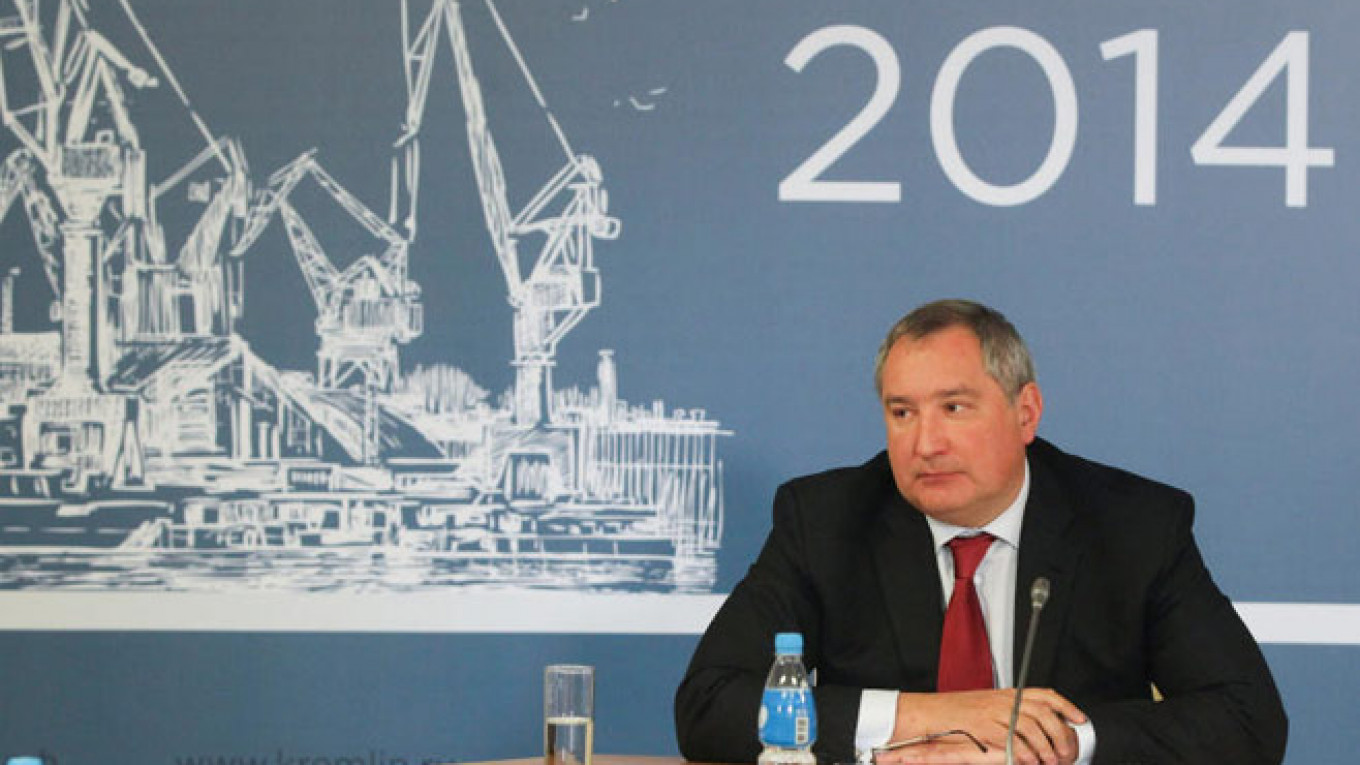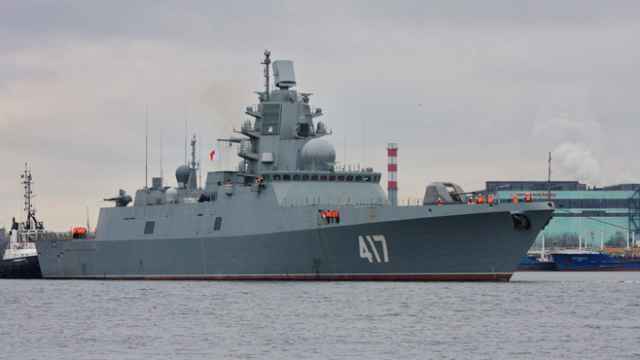Moscow's breakup with Ukraine has forced the Russian navy to suspend construction of a variety of next-generation warships, throwing the future of Russia's naval rearmament campaign into question.
A major part of Russia's communist-era military shipbuilding industry is located in Ukraine, a former Soviet republic, but Moscow's support for Ukrainian separatists over the past 18 months has prompted Kiev to curb defense industry trade between the two countries.
Deputy Prime Minister Dmitry Rogozin said Tuesday the disruptions would paralyze Russia's navy construction program: "Due to the termination of supply [of gas turbines from Ukraine], we cannot complete the construction of surface vessels for the navy," he was quoted by news agency TASS as saying.
Russia's shipbuilding industry is working to substitute 186 types of components and equipment, "in particular gas turbine engines," Rogozin said. But until this process is completed, no new surface ship construction projects will be launched and current programs are suspended, he said, news agency RIA Novosti reported.
See factbox: Russian Warships Delayed by Ukraine Crisis
A Dream Deferred
The supply rupture throws a wrench into Russia's huge naval expansion drive, part of a 20 trillion ruble ($370 billion), decade-long rearmament program set to wrap up in 2020. Though specific budget breakdowns under the program are not publicly known, the navy was expecting up to 100 new ships over the duration of the program.
According to Rogozin, who oversees Russia's defense industry, the process of import substitution should be completed by 2018 — meaning that shipbuilding plans will be frozen for at least three years.
Ukraine's decision to cut Russia off from its defense exports threatens Russia's phased approach to rebuilding its navy, which mainly consists of aging Soviet-era vessels that are fast approaching their retirement dates.
The first step of the shipbuilding program, the construction of two new classes of nuclear submarines, is already well under way and there is no indication that the conflict with Ukraine has slowed their construction.
Step two, which is coinciding with the submarine construction, focuses on smaller corvettes and frigates that rely on engines built in Ukraine.
By freezing construction of these ships while Russia develops alternate components, the navy will have to wait longer to begin phase three: the construction of new destroyers and cruisers.
Dead in the Water
Plans to build sizable fleets of Russia's three newest classes of surface vessels are now dead in the water. Eight ships will have to wait at least three years before construction can be completed, and construction of at least a dozen more will not begin until supply issues are fixed, according to news reports.
Only one of Russia's newest, largest and most capable types of warships, the Admiral Gorshkov-class frigate, has entered service with the navy. A second Admiral Gorshkov is in the water but without an engine, while two more have already been laid down.
The Defense Ministry has ordered eight of the ships and hinted that it will place at least a dozen additional orders to buy Admiral Gorshkov-class vessels for each of its four major fleets.
Likewise, only one of the slightly smaller Admiral Grigorovich-class frigates has entered service. The remaining five of the six ships designed and ordered specifically for Russia's Black Sea Fleet are now stuck in various stages of completion.
Ukraine is not the only nation throwing a wrench in Russia's near-term naval expansion plans. An EU arms embargo, imposed over Russian actions in Ukraine, has deprived shipbuilders of electronic components needed to build a class of advanced corvettes known as the Gremyashchy class.
Two of these corvettes are being completed using less capable Russian analogues, but a representative of the shipyard building them said two weeks ago the difficulty of sourcing replacement parts has led to the cancellation of plans to build eight more Gremyashchy corvettes.
Impact on Navy
Work has already begun on a Russian turbine. In early May, Valery Ryzhov, chief designer of the Kolomensky engine plant, told industry news site FlotProm.ru that the company was working with Russian aircraft engine company Saturn to design a new turbine for Russian naval vessels.
But Rogozin's estimate that the project will take at least two to three years to complete means Russia's naval strength will be hampered. The majority of Russia's fleet is made of aging Soviet-era surface ships, which are increasingly less seaworthy.
The delays in construction of the first wave of replacements will hurt Russia's capacity to deploy a new coastal defense force — one of its prime directives.
In the long term, the delays will damage Russia's ability to field an oceangoing navy. The plan had been to complete the new frigates and corvettes before moving on to new destroyers and cruisers — the largest combat ships in service with modern navies — in the late 2020s.
Contact the author at [email protected]
A Message from The Moscow Times:
Dear readers,
We are facing unprecedented challenges. Russia's Prosecutor General's Office has designated The Moscow Times as an "undesirable" organization, criminalizing our work and putting our staff at risk of prosecution. This follows our earlier unjust labeling as a "foreign agent."
These actions are direct attempts to silence independent journalism in Russia. The authorities claim our work "discredits the decisions of the Russian leadership." We see things differently: we strive to provide accurate, unbiased reporting on Russia.
We, the journalists of The Moscow Times, refuse to be silenced. But to continue our work, we need your help.
Your support, no matter how small, makes a world of difference. If you can, please support us monthly starting from just $2. It's quick to set up, and every contribution makes a significant impact.
By supporting The Moscow Times, you're defending open, independent journalism in the face of repression. Thank you for standing with us.
Remind me later.






